《全新版大学进阶英语综合教程3》unit3教案
- 格式:doc
- 大小:268.00 KB
- 文档页数:22
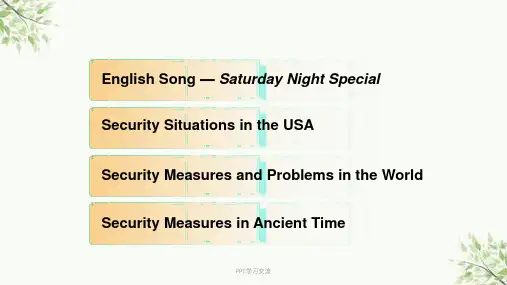
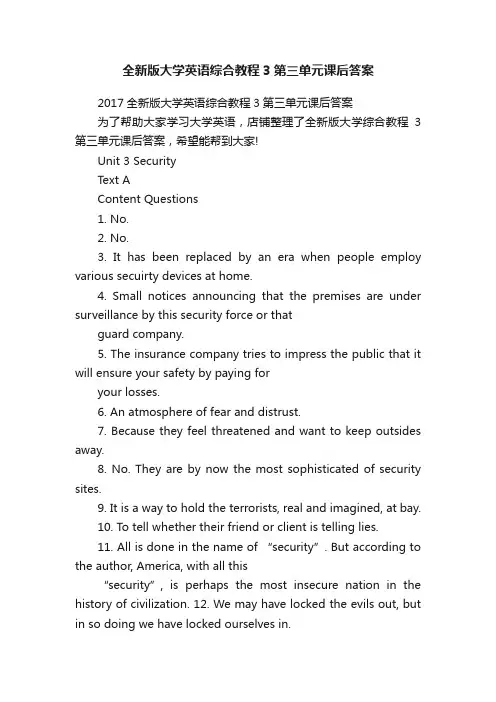
全新版大学英语综合教程3第三单元课后答案2017全新版大学英语综合教程3第三单元课后答案为了帮助大家学习大学英语,店铺整理了全新版大学综合教程3第三单元课后答案,希望能帮到大家!Unit 3 SecurityText AContent Questions1. No.2. No.3. It has been replaced by an era when people employ various secuirty devices at home.4. Small notices announcing that the premises are under surveillance by this security force or thatguard company.5. The insurance company tries to impress the public that it will ensure your safety by paying foryour losses.6. An atmosphere of fear and distrust.7. Because they feel threatened and want to keep outsides away.8. No. They are by now the most sophisticated of security sites.9. It is a way to hold the terrorists, real and imagined, at bay.10. To tell whether their friend or client is telling lies.11. All is done in the name of “security”. But according to the author, America, with all this“security”, is perhaps the most insecure nation in the history of civilization. 12. We may have locked the evils out, but in so doing we have locked ourselves in.Text Organization1.2.1) Doors are not left unlocked either in cities or in rural areas.2) Dead-bolt locks, security chains, electronic alarm systems and trip wires are widely in use.3) Suburban families have steel bars built in sliding glass doors.4) Small notices warning against burglary are commonly seen pasted on the windows of the mostpleasant of homes.5) Access cards are required of those who work with medium to large-size companies.6) Airport security uses electronic X-ray equipment to guard against terrorism.7) Businessmen employ new machines linked up to their telephone to help determine whether thecaller is telling lies or not.Suburban housewives wear rape whistles on their key chains.Text Organization1.2.1) Doors are not left unlocked either in cities or in rural areas.2) Dead-bolt locks, security chains, electronic alarm systems and trip wires are widely in use.3) Suburban families have steel bars built in sliding glass doors.4) Small notices warning against burglary are commonly seen pasted on the windows of the mostpleasant of homes.5) Access cards are required of those who work with medium to large-size companies.6) Airport security uses electronic X-ray equipment to guard against terrorism.7) Businessmen employ new machines linked up to their telephone to help determine whether thecaller is telling lies or not.Suburban housewives wear rape whistles on their key chains.Language Sense EnhancementI. 1) electronic5)7) 9)。

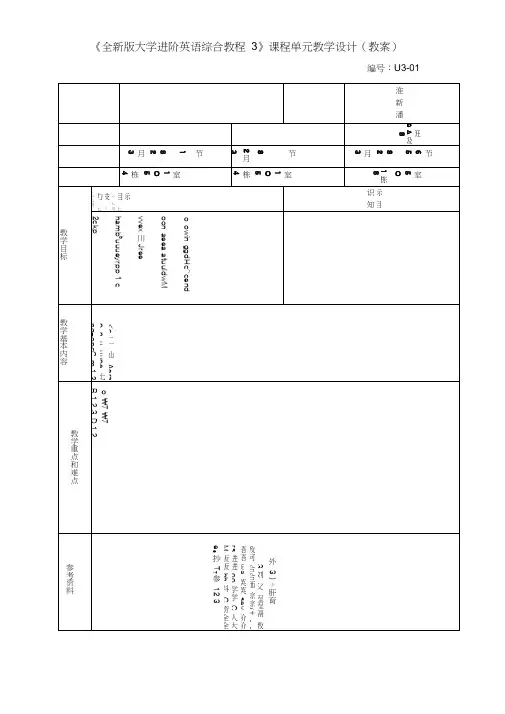
《全新版大学进阶英语综合教程3》课程单元教学设计(教案)编号:U3-01Opener:Pair work: The pictures below compare Westerners (marked in blue) and Chinese (marked in pink) in their way of looking at children and the family, travelling, and the role of the boss in an organization. Look at the pictures an work with your part ner to an swer the questio ns that follow.Helpful Expressi ons接送孩子 drop off and pick up the child 风土人情 local customs and culture 至吐匕一游 been here, done that 高高在上 superiority 有权有势 powerfulQuestio ns:1 In what way does the role of grandparents in Chinese families differ from that in Western families?2 In what way do Western tourists and Chin ese tourists behave differe ntly?3 In what way do Western and Chinese employees differ in the way they look upon their boss?Tips in this part:1. In troduce the topic to the class by ask ing if they can give any example of how Chinese and non-Chinese behave or think differently in life.2. Explai n the pictures in Opener that illustrate the differe nces betwee n the Westerners and Chin ese in their perspective on differe nt issues.3. Ask Ss to look at the pictures and discuss the differences in pairs with the aid of the questi ons that follow.4. To sum up, have differe nt pairs report to the class their discussi on on the pictures, one pair for one picture.Video watchi ng:After watch ing a video clip about an in terview with three foreig n wome n marrying Chinese husbands, discuss the following questions with yourSteps(步骤)教学组织1.whe n what is the differe nee Trave^llfiMg■SiStep One(步骤一)Step Two(步骤二)part ner.《全新版大学进阶英语综合教程3》课程单元教学设计(教案)编号:Comprehe nsion check1. Text Orga ni zati onPair work: This text is organized around the cultural shock the authorexperieneed after the birth of her daughter and her mother-in-law ' fulltime presenee in her family. It can roughly be divided into six parts. Now complete the follow ing table by writ ing dow n the main idea of each part. The first one has been done for you. When you finish, compare notes with your partner.Steps(步骤)教学组织Step One (步骤一)2 Comprehe nsion Check Pair work: With the teacher as guide, you and your partner work on the follow ing comprehe nsion check exercises. 2.1 Diggi ng into detailAn swer the follow ing questi ons to better un dersta nd the text. You may wantto write dow n some key words in the space provided before you do so. (Para. 6) 1 What made the author so mad about her husba nd that they bega n to fight over childcare duties?The fact that he wasn ' t tak ing on half of the childcare duties, and he thought it was more important to spend time on his work than on his daughter, and his expectation that his mother would do all the housework he was supposed to do.(Para. 8) 2 How did her mother-i n-law explai n her role in the family?Her mother-in-law explained that her role in the family was to lighten the burde n of her son, allow ing him to keep his former way of life, and to help her daughter- in-law out with pare nti ng and household man ageme nt.(Para. 9) 3 What did the author think of her mother-in-aw ' s explanation?She thought it was absolutely un acceptable, because, in her view, her husband is one of two parents, and therefore their daughter should be half his responsibility; and she married her husband, not her mother-in-law.(Para. 13) 4 How come her husband, unlike the author, failed to adopt daily habits around the schedule of their daughter?He obviously believed that mothers are the primary caregiver of childre n and this was the no rmal differe nee betwee n mothers and fathers.(Para. 16) 5 How did the author react whe n she was told that, now that her mother-in-law helped her out by taking care of her daughter, it was her resp on sibility to take care of her mother-i n-law whe n she was old?She totally rejected the idea, because she thought what her mother-in-law did was fulfillingthe parenting responsibility of her husband, therefore it was her husband ' s responsibility to take care of his own mother when she was old. 2.2 Un dersta nding difficult senten cesTips in this part :1. Before moving onto the author ' s explou n ttp Ss the text can rough divided into six parts.2. Guide Ss to explore the text by asking them to work on the table in Orga ni zati on and do the task in Digg ing into detail.3. Ask Ss to sum up the differences of views between the author and her mother- in-law on matters described in the text.4. Check Ss' understanding by guiding them through the tasks in Un dersta nding difficult senten ces. Text An alysisThe author ' r eflections on childcare are skilfully framed between the con versati ons with other wives that ope n and close the text. The ope ning sets the scene and introduces her husband and herself. Next comes her mother-in-law, whose strong senseof duty is expressed in a shift to short, emphatic senten ces:“ Her role isclear. She has to be here. ”What follows is part factual account, part persuasive argument. The author does not simply give a neutral description of the differences between her husba nd and herself. She clearly wishes to persuade us that she is right and he is wrong. As a con seque nceher writ ing contains much in com mon with other pieces of persuasive writing. There are therhetorical questions : “lam expected …but he is relieved of his fatherly duties …?” “ Why does he getout of the datasks …?T here is the emotive Ianguage. She is "incensed a f what she sees as hisStep Two(步骤二)“ laz in ess ” ; he “ was n' t honouring ” his role as a father.Towards the end she admits that he has made an effort to compromise, though eve n here she is quick to add “ in resp onse to my growli ngwith the impression of an uneasy truce rather than a meeting of minds.Step Three (步骤三)II. Lan guage FocusWords and expressi ons1. negotiation: n.磋商;谈判e.g. The 6-month negotiations between the two countries ended fruitlessly. 两国谈判半年一无所获。


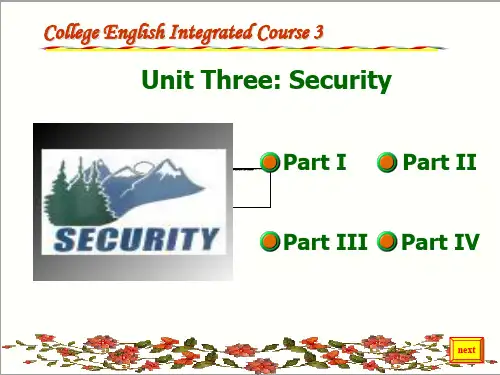
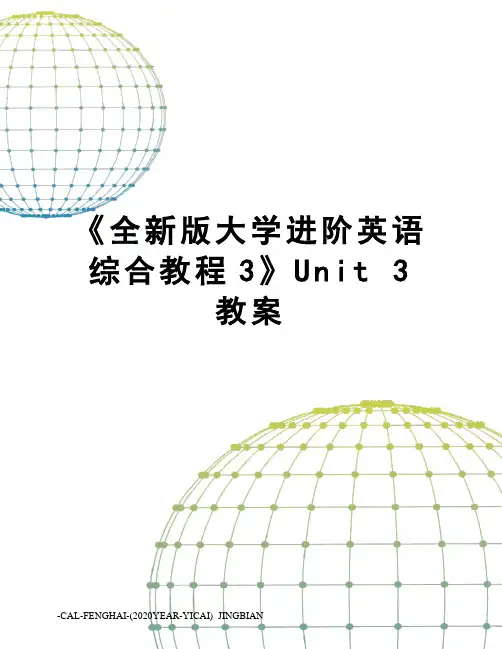
《全新版大学进阶英语综合教程3》U n i t3教案-CAL-FENGHAI-(2020YEAR-YICAI)_JINGBIAN《全新版大学进阶英语综合教程3》课程单元教学设计(教案)编号:U3-01Steps(步骤)教学组织Step One(步骤一)Opener:Pair work: The pictures below compare Westerners (marked in blue) andChinese (marked in pink) in their way of looking at children and the family,travelling, and the role of the boss in an organization. Look at the pictures andwork with your partner to answer the questions that follow.Helpful Expressions接送孩子 drop off and pick up the child风土人情 local customs and culture到此一游 been here, done that高高在上 superiority有权有势 powerfulQuestions:1 In what way does the role of grandparents in Chinese families differ fromthat in Western families?2 In what way do Western tourists and Chinese tourists behave differently?3 In what way do Western and Chinese employees differ in the way they lookupon their boss?Tips in this part:1. Introduce the topic to the class by asking if they can give any example ofhow Chinese and non-Chinese behave or think differently in life.2. Explain the pictures in Opener that illustrate the differences between theWesterners and Chinese in their perspective on different issues.3. Ask Ss to look at the pictures and discuss the differences in pairs with theaid of the questions that follow.4. To sum up, have different pairs report to the class their discussion on thepictures, one pair for one picture.Step Two(步骤二)Video watching:After watching a video clip about an interview with three foreign womenmarrying Chinese husbands, discuss the following questions with yourpartner.《全新版大学进阶英语综合教程3》课程单元教学设计(教案)编号:U3-02《全新版大学进阶英语综合教程3》课程单元教学设计(教案)编号:U3-03《新视野大学英语(第三版)》Book 3课程单元教学设计(教案)编号:U3-04DiscussionDiscuss what you like / dislike about where you live.things you like:a food market; a bookstore; close to the metro; a good hospital / medical care centerthings that are nice but not essentiala good local supermarket; a sports center;a theater / cinema; a barthings you dislike:lacking of parking space; various types of noise; pollution; high crime rateThink about your neighborhood. What would make it:saferLectures should be given to tell people how to prevent fire, theft and other dangers. Besides, the police should make sure the streets are safe –not only from crime but also from traffic accidents.more beautifulI think we should plant more trees and flowers in the community. In addition, we should discipline our own behavior and should not litter garbage everywhere or draw on the buildings.more interestingMore entertainment activities should be held to draw the interest of people. Meanwhile, don’t forget the children. We should also provide them with facilities to give them fun and joy.better for your healthI think we should build a community gym providing a variety of affordable exercise options. Besides, activities should be conducted to help people quit smoking or excessive drinking.more of a communityI’d really like to see a good shopping mall, where people can meet, get to know each other and entertain themselves.。
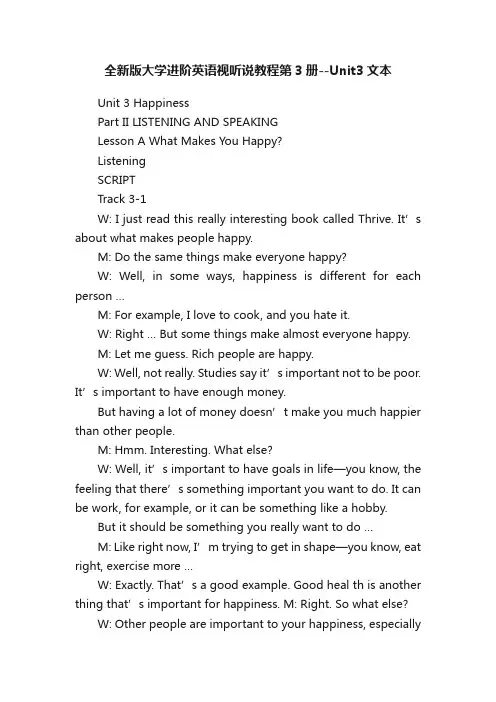
全新版大学进阶英语视听说教程第3册--Unit3文本Unit 3 HappinessPart II LISTENING AND SPEAKINGLesson A What Makes You Happy?ListeningSCRIPTTrack 3-1W: I just read this really interesting book called Thrive. It’s about what makes people happy.M: Do the same things make everyone happy?W: Well, in some ways, happiness is different for each person …M: For example, I love to cook, and you hate it.W: Right … But some things make almost everyone happy.M: Let me guess. Rich people are happy.W: Well, not really. Studies say it’s important not to be poor. It’s important to have enough money.But having a lot of money doesn’t make you much happier than other people.M: Hmm. Interesting. What else?W: Well, it’s important to have goals in life—you know, the feeling that there’s something important you want to do. It can be work, for example, or it can be something like a hobby.But it should be something you really want to do …M: Like right now, I’m trying to get in shape—you know, eat right, exercise more …W: Exactly. That’s a good example. Good heal th is another thing that’s important for happiness. M: Right. So what else?W: Other people are important to your happiness, especiallyyour family.M: What about friends?W: Yes, friendship is important, too. Good relationships with family members and friends really increase our happiness.ConversationTrack 3–2A: What do you think people need to be happy?B: I think money is the most important thing.A: Really? Why do you think that?B: Because if you have money, you can buy things you want.A: That’s true. I think that’s important, but I think your family is important, too.Lesson B The Happiest Places on EarthListening 1SCRIPTTrack 3-3Welcome to San Luis Obispo, California — a city of forty-four thousand located between Los Angeles and San Francisco. What makes this one of the happiest cities in the United States? The area’s natural beauty is one important factor. The city is close to both the ocean and the mountains, and there are lots of places for residents to hike or bike. San Luis Obispo itself is a very laid–back city. It has a number of parks, cafes, and open areas where people can relax. And even in the downtown area, there are very few cars and almost no traffic. The city is also very safe. Believe it or not, many people don’t lock their doors during the day … or at night. In addition to these things, San Luis Obispo also has a lively arts scene. Every summer there are free concerts and a number of music and art festivals. And finally, San Luis Obispo is a healthy environment. Fresh fruit and vegetables are all grownlocally. And there is no smoking in restaurants and most outdoor public places.Now, what about the people of San Luis Obispo. What are they like? Residents are known for their high levels of emotional well-being. They smile more and experience less sadness than people in other cities in the US. Not surprisingly, people here are very active. Many bike to work or school every day. Residents are also very sociable. They spend a lot of time with family and friends. Many also volunteer and help others in the community.1. San Luis Obispo: 圣路易斯-奥比斯波位于美国加州,是一个依山傍海的太平洋沿岸城市。
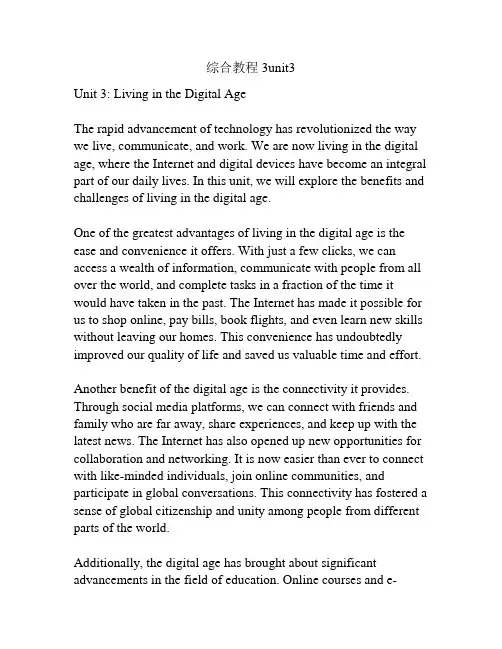
综合教程3unit3Unit 3: Living in the Digital AgeThe rapid advancement of technology has revolutionized the way we live, communicate, and work. We are now living in the digital age, where the Internet and digital devices have become an integral part of our daily lives. In this unit, we will explore the benefits and challenges of living in the digital age.One of the greatest advantages of living in the digital age is the ease and convenience it offers. With just a few clicks, we can access a wealth of information, communicate with people from all over the world, and complete tasks in a fraction of the time it would have taken in the past. The Internet has made it possible for us to shop online, pay bills, book flights, and even learn new skills without leaving our homes. This convenience has undoubtedly improved our quality of life and saved us valuable time and effort.Another benefit of the digital age is the connectivity it provides. Through social media platforms, we can connect with friends and family who are far away, share experiences, and keep up with the latest news. The Internet has also opened up new opportunities for collaboration and networking. It is now easier than ever to connect with like-minded individuals, join online communities, and participate in global conversations. This connectivity has fostered a sense of global citizenship and unity among people from different parts of the world.Additionally, the digital age has brought about significant advancements in the field of education. Online courses and e-learning platforms have made education accessible to people of all ages and backgrounds. Students no longer need to be physically present in a classroom to learn. They can access educational materials, participate in discussions, and complete assignments from anywhere in the world. This has expanded educational opportunities and democratized learning, allowing more people to gain knowledge and skills.However, living in the digital age also presents its share of challenges. One of the main concerns is the issue of privacy and security. With the amount of personal information we share online, there is an increased risk of identity theft, cyberbullying, and other forms of online harassment. It is crucial for individuals to be vigilant and take necessary precautions to protect their privacy and security in the digital world.Another challenge is the digital divide. While many people have access to the Internet and digital devices, there are still those who are left behind due to various factors such as socioeconomic status or geographical location. This divide prevents equal opportunities for everyone to benefit from the advantages of the digital age. Efforts should be made to bridge this divide and ensure that everyone has access to the digital tools and resources they need. Furthermore, the constant use of digital devices and the Internet has led to a decline in face-to-face interactions and physical activities. People spend more time in front of screens, leading to sedentary lifestyles and health issues such as obesity and eye strain. It is essential to find a balance between the digital world and the real world and to prioritize human connections and physical well-being.In conclusion, living in the digital age has greatly transformed our lives, offering convenience, connectivity, and educational opportunities. However, it also poses challenges such as privacy and security concerns, the digital divide, and the impact on personal interactions and health. It is important for individuals and society as a whole to navigate the digital age responsibly, taking advantage of its benefits while addressing its challenges.。
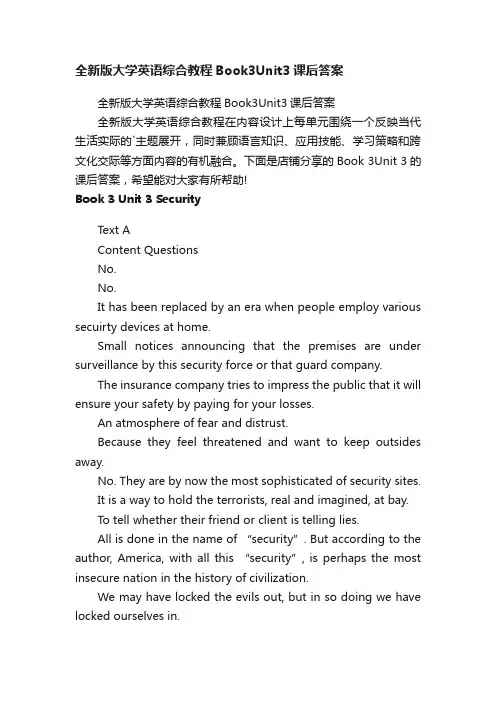
全新版大学英语综合教程Book3Unit3课后答案全新版大学英语综合教程Book3Unit3课后答案全新版大学英语综合教程在内容设计上每单元围绕一个反映当代生活实际的`主题展开,同时兼顾语言知识、应用技能、学习策略和跨文化交际等方面内容的有机融合。
下面是店铺分享的Book 3Unit 3的课后答案,希望能对大家有所帮助!Book 3 Unit 3 SecurityText AContent QuestionsNo.No.It has been replaced by an era when people employ various secuirty devices at home.Small notices announcing that the premises are under surveillance by this security force or that guard company.The insurance company tries to impress the public that it will ensure your safety by paying for your losses.An atmosphere of fear and distrust.Because they feel threatened and want to keep outsides away.No. They are by now the most sophisticated of security sites.It is a way to hold the terrorists, real and imagined, at bay.To tell whether their friend or client is telling lies.All is done in the name of “security”. But according to the author, America, with all this “security”, is perhaps the most insecure nation in the history of civilization.We may have locked the evils out, but in so doing we have locked ourselves in.Text Organization1.2.1) Doors are not left unlocked either in cities or in rural areas.2) Dead-bolt locks, security chains, electronic alarm systems and trip wires are widely in use.3) Suburban families have steel bars built in sliding glass doors.4) Small notices warning against burglary are commonly seen pasted on the windows of the most pleasant of homes.5) Access cards are required of those who work with medium to large-size companies.6) Airport security uses electronic X-ray equipment to guardagainst terrorism.7) Businessmen employ new machines linked up to their telephone to help determine whether the caller is telling lies or not.Suburban housewives wear rape whistles on their key chains.Language Sense EnhancementI. 1) electronic 2) hooked up to3) suburban 4) built in5) uncommon 6) announcing7) survaillance 8) symbol9) featured 10) attached toLanguage FocusVocabulary1.4) closed up6) paste8) sideways10) universal12) Bathed in2) looked back on4) fit into6) lies in8) stand for3. 1) A certain gene which is likely to make people vulnerable to asthma has been found byresearchers at the Department of Clinical Medicine in Oxford.2) A wardrobe with mirrored doors had to be built in so as to make their small bedroom look larger.3) The NBC show's opening shots feature the space shuttle Challenger blowing up in January 1986—killing all seven crew.4) When the teacher threatened to keep the pupils in after school they were quieted at once.5) Energy difficulties are a major barrier to the country's economic growth due to the fact that imported oil has absorbed 40% of its foreign exchange / because imported oil has absorbed 40% of its foreign exchange.4. 1) Jacob looked back on his summer holidays spent on the Big Island of Hawaii with itsbeautiful landscape and tranquil atmosphere as a rare escape from the madness of urban life.2) Learning in the information era is really convenient and efficient. With your computer hooked up to the internet, you can easily obtain the electronic resources relevant to your research.3) Detectives, who believe more than one person is behindthe constant attacks in the suburb, are using a sophisticated computer system to analyze specific behavior and situations. However, they are also aware that they shouldn’t rely too much on computer because it may make errors at times..II. Collocation1. away2. inside/in3. forward/through4. back5. off6. home7. back, down 8. in, outIII. UsageInternet is not such an unusual word as it used to be.Most men do not look unattractive in them.Wealthy as she is, she is not unconcerned by her sudden unemployment.This claim is not unrealistic in view of a sharp decrease in the city's violent crimes.His poor health is not unrelated to his unhealthy way of life.Comprehensive ExercisesI. Cloze1.1. Statistics2. rural3. era4. stood for5. on the latch6. vulnerable7. barriers 8. electronic9. reflection 10.civilized2.1. tougher2. liable3. shift4. electric5. cautious6. sophisticated7. thieves 8. break9. chances 10. signsII. Translation1.1). The Internet is changing the way people live, no matter whether they are in urban or rural areas.2). Medium-sized and small companies are more vulnerable to the threat of the global economic crisis than large ones.3). With regard to our term papers, the professor asked us to analyze the chart of unemployment first, and then provide critical reflections on the nation’s economic development.4). It never occurred to him that their team would win the basketball match by a large margin.5). Looking back on my twenty years’ teaching in hi gh school, I attributed my success to patience, talent, and the constant pursuit of knowledge.2.It is almost impossible to keep a determined burglar out. All you can do is discourage him for a few minutes, thus exposing him to police patrols or those wandering around. Common sense tells us that lighting is a barrier to criminal activity. A light should be fixed in the doorway and switched on at night. Make sure/assure yourself that you don’t leave the door on the latch if you happen to be the last to come in. If you decide to buy a sophiticated electronic alarm system, be sure to ask for its signs and put them up on both windows and doors. In addition you may have it hooked up to a police station.【全新版大学英语综合教程Book3Unit3课后答案】。
全新版大学英语综合教程第三册教案全新版大学英语综合教程第三册College English Integrated CourseBook Three Unit OneChanges in the Way We LiveText A Changes in the Way We LiveObjectivesStudents will be able to:1.grasp the main idea (tolerance for solitude and energy made it possible for the writer's family to enjoy theirpleasant but sometimes harsh country life);2.appreciate the various techniques employed by the writer (comparison and contrast, topic sentencesfollowed by detail sentences, use of transitional devices, etc.);3.master the key language points and grammatical structures in the text;4.conduct a series of reading, listening, speaking and writing activities related to the theme of the unit. Time Allotment1st period 2nd period 3rd period 4th periodPre-reading tasks Text organization Language study Post-reading tasksCultural notes Language study Text analysisPre-reading Tasks1.T asks Ss the following questions on the song Out in the Country:—What is the song about? (taking a break from city life, escaping from thecrowd)—How is the song related to the theme of this unit? (The singer needs a break because the pace of life hasquickened, the environment has been changed, and the old life style is gone.)2.1) Ss divide into three large groups, under each group smaller sub-groups may form. Each large group isassigned one of the following discussion topics:—Why do so many migrant workers ( 民工) move from the country tothe city?—Why do city people buy apartments or houses in the suburbs, even in the countryside?2) After the discussion, speakers of some sub-groups report to class.3) T may sum up like this: People change their places of living because they look for things that theirprevious life is unable to provide. However, once life has been changed, they miss the good old days. 3. Ss do Cloze B in after-text exercises to learn about Americans' ideal of a country life. Then T leads in tothe study of Text A.Text Organization and AnalysisParts Paragraphs Main IdeasPart One Paras 1-3 The writer views his life in the country as a self-reliant and satisfying one.Part Two Paras 4-7 Life in the country is good yet sometimes very hard.Part Three Paras 8- 11 After quitting his job, the writer 's income was reduced, but heand his family can manage to get by.1College English Integrated CourseBook Three Unit One全新版大学英语综合教程第三册Part Four Para 12-15 A tolerance for solitude and a lot of energy have made it possiblefor the family to enjoy their life in the country.The author writes his piece in a clear and logical way. In many instances he employs the pattern of “onetopic sentence + several detail sentences ” structure. It 's easyfor readers to grasp the main idea, and it is alsoproven effective for learner writers like our students.Sometimes the detail sentences run parallel to each other, like those in Para 2. In some other paragraphs the detail sentences have their own hierarchy. Take Para 5 for example. The first sentence tells how busy “ I ” am. The second sentence stat es that Sandy, the wife, is also busy. The final sentence is a kind of summaryYet following the second sentence there are a few more—nobody can relax. detail sentences showing exactly how tight a scheduleSandy has. Take Paras 12-13 for another example. T he topic sentence therein is “Isuspect not everyone who loves the country would be happy living the way we do. It takes a couple of special qualities. ” Then there are two sub- topic sentences: “One is a tolerance for solitude ”; “The other requirement is energy —a lot of it. ” Each sub -topic sentence has itsown supporting details.Sometimes there is no transitional devices between detail sentences, sometimes there are, the most frequently used one of which is time words or phrases. For example, the detail sentences in Para 4 begin with“three months ago ”, “three months from now ”, “ recently ” , and “later this month ”, respectively. To be sure, other conjunctions scatter the text, like “first ”, “then”, “then ”, “eventually ” inPara 7.Cultural Notes1.the countryside: The countryside of Britain is well known for its beauty and many contrasts: its baremountains and moorland, its lakes, rivers and woods, and its long, often wild coastline. Many of the mostbeautiful areas are national parks and are protected from development. When British people think offarmland, as well as open spaces, they imagine cows or sheep in green fields enclosed by hedges or stonewalls, and fields of wheat and barley.Many people associate the countryside with peace and relaxation. They spend their free time walkingor cycling there, or go to the country for a picnic or a pub lunch. Only a few people who live in thecountry work on farms. Many commute to work in towns. Many others dream of living in the country,where they believe they would have a better and healthier lifestyle.America has many areas of wild and beautiful scenery, and there are many areas, especially in theWest in states like Montana and Wyoming, where few people live. In the New England states, such asVermont and New Hampshire, it is common to see small farms surrounded by hills and green areas. InOhio, Indiana, Illinois and other Midwestern states, fields of corn or wheat reach to the horizon and thereare many miles between towns.Only about 20% of Americans live outside cities and towns. Life may be difficult for people wholive in the country. Services like hospitals and schools may be further away, and going shopping can meandriving long distances. Some people even have to drive from their homes to the main road where theirmail is left in a box. In spite of the disadvantages, many people who live in the country say that they likethe safe, clean, attractive environment. But their children often move to a town or city as soon as they can.As in Britain, Americans like to go out to the country at weekends. Some people go on camping orfishing trips, others go hiking in national parks.2.Fahrenheit scale: a scale of temperature, first established bythe German physicist Gabriel Fahrenheit in1715. The unit of temperature is the degree Fahrenheit (?F), and 0?F was originally the coldest temperatureFahrenheit could achieve using a freezing mixture of salt and ice.On his scale, water freezes at 32?F andboils at 212?F (under set atmospheric conditions). No longer used in scientific work, Fahrenheittemperatures still feature in everyday language; hot days "in the eighties", for example. To convert aFahrenheit temperature to Celsius (centigrade), subtract 32, then multiply by5/9.3.Celsius scale: a scale of hotness, or temperature, first established by the Swedish scientist Anders Celsius(1701-1744) in 1742. On this scale, the unit of temperature is the degree Celsius (?C); water freezes at 0?Cand boils at 100? C (under agreed standard atmospheric conditions), although when Celsius originallydevised the scale he made 100?the boiling-point and 0? the freezingpoint. The Celsius scale was formerlycommonly known as the centigrade scale because of the 100 divisions betweenthe freezing- and2College English Integrated CourseBook Three Unit One 全新版大学英语综合教程第三册boiling-points of water. To convert from degrees Celsius to degrees Fahrenheit multiply by 9/5 and add 32. 4. Ivy League: eight long- established colleges and universities in the United States with prestigiousacademic and social reputations. Members of the Ivy League are Brown University in Providence, RhodeIsland; Columbia University in New York City; Cornell University in Ithaca, New York; DartmouthCollege in Hanover, New Hampshire; Harvard University in Cambridge, Massachusetts; University ofPennsylvania in Philadelphia; Princeton University in Princeton, New Jersey; and Yale University in NewHaven, Connecticut. The members of the Ivy League compete in intercollegiate athletics. 5. Sports Illustrated: a popular US sports magazine published each week by Time Inc. part of Time Warner.It first appeared in 1954, and is read mainly by men. The magazine also publishes the Sports IllustratedSports Almanac every year.6. Individual Retirement Account (IRA): a US government plan that allows people to put part of theirincome into special bank accounts. No tax has to be paid on this money until they retire. 7. Buying Insurance: People face many choices when buying insurancepolicies. They commonly choose aninsurance provider based on several criteria. Some of the most important of these include: 1) the financialstability of the insurance company, 2) the price of policies, and 3) details of coverage and service.Only a financially sound company can fulfill its promise to pay in all circumstances. Companieswith proven records of stability can provide insurance security. Choice of a provider based solely on price,on the other hand, may result in poor service and coverage, even if the provider advertises comprehensivecoverage and high quality service.Policy prices vary significantly among companies, but competition usually forces most companies 'prices into a narrow range. The greater cost of some policies may pay off in the long run through betterprotection. Thus, a detailed examination of coverage in policies provided by different, well-regardedcompanies can help consumers make the best choice based on the risks they face, their needs, and theirfinances.People seeking to buy insurance often use the services of an insurance agent or broker to assist intheir purchase. Most insurance falls into four main categories, according to whatit covers: 1) property andcasualty, 2) life, 3) health and disability, and 4) old-age and unemployment. Insurers commonly refer toinsurance purchased by individuals as personal lines coverage and to insurance purchased by businessesas commercial coverage.Language Study1. get by: be good enough but not very good; manage to live or do things in a satisfactory way Examples:My parents managed to get by on a small amount of money.It is a little bit difficult for the old couple to get by on such a small pension.We can get by with four computers at the moment, but we'll need a couple more when the newstaff members arrive.2. ... when it was 30 below: Here the Celsius scale is used instead of the Fahrenheit scale, (see CulturalNotes)3.indoor: situated or used inside a buildingExamples: Indoor pollution has been found to be as much as five to ten times higher inside someskyscrapers than outside.Tobacco smoke is considered as an indoor pollutant.The Mall of America, the biggest mall in USA includes the world's largest indoor amusementpark.4.pursue: followExamples: After graduation Martin chose to pursue the same career as his father as a minister.College students are advised to pursue a wide range of subjects.Public evening classes allow people to earn a living during the day and pursue vocational andintellectual interests in their spare time.5.get through: come successfully to the endExamples: The local government has taken some measures to ensure that all the people will get throughthe winter.She got through the entrance examination and was accepted by the college.3College English Integrated CourseBook Three Unit One 全新版大学英语综合教程第三册6.at that point: at that very moment, right thenExamples: The train was now only a couple of yards from the kids on the track. At that very point,Anthony threw himself forward and pulled them clear .The man suddenly held up a poster. At that point, all TV cameras were pointed at him. 7. on balance: with all things consideredExamples: I think, on balance, I didn't treat you unfairly.On balance, it's probably not advisable to change the company's name.8.illustrate:provide with visual features; clarify by use of examples, etc.Examples: Let me use another example to illustrate this difficult point.The editor has illustrated the book with black-and-white photographs.9.I'm not making anywhere near as much money as I did ...: I am not earning as much money as I did ...10.generate: bring into existence, produceExamples: The widespread use of Spanish in some American cities has generated a public debate overlanguage use in the country.Space technology has generated thousands of products for everyday use such as lightweightmaterials used in running shoes.11.insurance: a guarantee that you will receive money if something is lost or damaged, or have repairs paidfor, by a financial company in return for regular payments you make to them Examples: Many nations have some form of compulsory unemployment insurance.People regularly buy insurance to reduce uncertainty and to protect themselves from futuredisasters.12.pick up: be ready to payExamples: If he loses the case, Michael will have to pick up the bill for legal costs.Taxpayers will be picking up the tab for the improved public transport network.13. aside from: except for; in addition to (more usual in American English; same as apart from)Examples: Aside from an occasional game of tennis, he doesn't take any exercise.This essay is good aside from a couple of spelling mistakes.They were going to have other expenses, aside from the school fees.14. cut back: reduce in size or amount (used in the patterns: cut back sth.; cut back on sth.)Examples: There is a growing movement to cut back the government's role in agriculture and to reducesubsidies paid to farmers.The government has cut back on defense spending.15. lower: make or become smaller in amount, degree, etc.Examples: Increasing your intake of fruits and vegetables can lower your risk of getting some types ofcancer.Governments may raise or lower taxes to achieve social and economic objectives. 16. dine out: eat a meal away from home (usu. in a restaurant) Examples: With the improvement of living standards, more people dine out at weekends.It's my daughter's birthday today, so we're dining out tonight.17.Extravagant Christmases are a memory, and we combine vacations with story assignments.: We nolonger have extravagant Christmases, and when a magazine sends me somewhere to write an article, I willtake my family along. By doing so, we can save some money.18.suspect: believe to be true, likely or probable; feel doubt about (used in thepatterns: suspect sb./ sth. ofsth.; suspect that)Examples: China banned cosmetics suspected of containing substances that cause mad cow disease.It was perfectly all right. Henry said, because the police had not suspected him of anything.Scientists realized that Mars' evolution had been more complex and fascinating than they hadsuspected.19.resist: keep from giving in to or enjoying (used in the patterns: resist sth.; resist doing sth.)Examples: We couldn't resist laughing at him in those funny clothes.Keep me away from the duty-free shop. You know I can't resist expensive perfumes. 20. temptation: the feeling of being tempted to do sth. that you know might be wrong or harmful; the thingyou want to have (uncount or count)4College English Integrated CourseBook Three Unit One全新版大学英语综合教程第三册Examples: The kids can't resist the temptation of McDonald's.In my view students should resist the temptation to take part-time jobs in their first two years atcollege.21. primarily: mainlyExamples: We are primarily concerned with improving our working conditions.Men can usually run faster than women, primarily because they have greater muscular strength.Post-reading Tasks1.Group discussion:a) Which is better, living in the country or living in the city?Please give reasons.b) What do you think are possible ways to improve the quality of our lives? 2. T guides Ss through some after-text exercises and checks on Ss' home reading.3. Essay-writingT asks Ss to write an essay entitled My Family Life.5College English Integrated CourseBook Three Unit One全新版大学英语综合教程第三册College English Integrated CourseBook Three Unit TwoCivil Rights HeroesText A The Freedom GiversObjectivesStudents will be able to:1.understand the main idea (early civil-rights struggles in the US, esp. the underground Railroad );2. learn to use library resources and other resources for information;3. grasp the key language points and grammatical structures in the text;4. conduct a aeries of reading, listening, speaking and writing activities related to the theme of the unit. Time Allotment1st period 2nd period 3rd period 4th periodPre-reading tasks Text organization Language study Post-reading tasksCultural notes Language study Text analysisPre-reading Tasks1. Tasks Ss the following questions on the recording:What are the special contributions of Abraham, John and Martin to the Americans?(They all advocated black civil rights.)How did they die?(They were all assassinated.)2.Knowledge of Christianity:1)T explains that, for historical reasons, many black slaves believed in Christianity, like Uncle Tom inUncle Tom' s Cabin. Therefore, in black writings there are frequent references to Christianity.2)T writes down the following vocabulary items on the blackboard: the Creator, and African AmericanMoses, Quaker, Bible, Methodist minister, Bethlehem salvation.3)Ss self-study their meanings by reading the New Words andExpressions and Proper Names sectionsfollowing the text.4)T checks Ss ' understanding and, if necessary, gives further guidance (seeText Analysis).3.Out-of-class research projects: T guides Ss through Writing Strategy, then tells them to form groups toresearch into the discussion questions in Part IV: theme-Related Language Learning Tasks by using libraryresources, the Internet and other resources. Each group member may focus on only one discussionquestion. They will share findings in a later class.4.Ss do Cloze B to get a better understanding of the Underground Railroad.Text Organization and AnalysisParts Paragraphs Main IdeasPart One Paras 1-5 It is high time to honor the heroes who helped liberate slaves byforging the Underground Railroad in the early civil-rights inAmerica.6College English Integrated CourseBook Three Unit Two 南昌大学教务处全新版大学英语综合教程第三册Part Two Paras 6-23 By citing examples the author praises the exploits of civil-rightsheroes who helped slaves travel the Underground Railroad to freedom.When we learn a foreign language, we must also learn the culture of the speakers of that language. Text A in this unit is a good case inpoint. Readers need some basic knowledge of Christianity. Some terms in this text are markedly Christian, like “Methodist Minister ”, “Bible“Quaker”. Others refer to characters or places fromBiblical stories, such as Moses who led the Jewish people out of slavery in Egypt, or Bethlehem, a holy city for Christian.The author tells three stories about the Underground Railroad and the early Black civil rights movement. The three stories are chosen because they are representative of all participants in this movement: John Parker is a freed slave who later turned into a courageous “conductor ”; Levi Coffin is a brave white“conductor ”; Josiah Hensonis a slave who struggled his way to freedom with the help of the Underground Railroad.We learn about the name of Josiah Henson at the beginning of the text, yet his full story is not told until the last part. In this way the author achieves coherence of text.Direct speech is more convincing than indirect speech, especially when it comes to expressing personal beliefs. For example, the text quotes Levi Coffin s aying “The Bible, in bidding us to feed the hungryand clothe the naked, said nothing about color. ”On other occasion, direct speech makes a story more vivid. For example, in the John Parker story, characters spoke short sentences to stress the urgency of the situation. For another example, Josiah Henson threw himself to the ground and shouted to astonished onlookers: “Oh, no! Don't you know? I 'm free! ” His joy affects us all.Cultural Notes1. Freedom and rights: Freedom of the individual is considered one of theessential features of westerncivilization, which is itself sometimes called the Free World. This freedom is often expressed in terms ofrights to do certain things or to be treated in a particularly way. When a person does something that othersthink strange, British and American people will often say, “it 's a free country. ” Meaning that althoughthey disagree with the choice they recognize the other person 's right to make it.Americans sometimes call the US the “land of the freed ” , a phras e taken from it national anthem.British people have always strongly defended their freedom. Fear that they will lose the freedom to decidetheir won future is behind many people 's lack of enthusiasm for European unity.In Britain and the US the most basic rights include freedom of expression(=freedom to say or writeanything), freedom of choice (=freedom to make decisions about your own life) and freedom of worship(=freedom to practice any religion).2.The civil rights movement: (in the US) the national campaign byAfrican-Americans for equal rights,especially in the 1950s and 1960s. the campaign included boycotts( =refusal to buy particular products).The actions of freedom riders, and in 1963 a march to Washington led by Martin Luther King. Itsucceeded in causing the introduction of bussing and affirmative action. The Civil Rights Act of 1965were also introduced as a result of the civil rights movement, which has helped to change the attitudes ofmany white American.3.the Civil Rights Act of 1964: the US law that forced the southern states to allow African-Americans toenter restaurants, hotels, etc. which had been reserved for whitepeople only and to end the practice ofhaving separate areas for black and white people in theatres, train stations, buses, etc. the act was mostlythe result of civil rights movement and was strongly supported by President Lyndon Johnson. It wasfollowed the next year by the Voting Rights Act.4.Uncle Tom 's Cabin: a novel (1852) by the US writer Harrie t Beecher Stowe which increased support forthe movement to free slaves. It is about a kind slave called Tom whois badly treated and finally killed bySimon Legree. Tom ' s daughter Little Eva also dies, and another well-known character in the novel is theslave child Topsy. The name Uncle Tom is sometimes used as andinsult to describe an African-Americanwho has too much respect for white people.5.the Underground Railroad: a secret system used in the US beforethe Civil War for helping thousands of7College English Integrated CourseBook Three Unit Two 南昌大学教务处全新版大学英语综合教程第三册slaves to escape to the free northern states or Canada. The slaveswere called “passengers ”, the people who helped them were“conductors ”, and the slaves hid in “stations ” ( safe houses) alongthe way.5.Slavery: Slavery played a particularly important role in the history of the US.The first slaves were taken to North America from Africa by theDutch in 1619. By the time of the American Revolution (1775) there were 500,000 slaves, mostly in the South. After the Revolution the northern states made slavery illegal but the South needed cheap labor for the cotton plantations. Gradually the South 's economy became dependent on slaves and by 1860, the year before the Civil War, there wereabout 4 million slaves.Conflict between the North and the South increased, and it becameclear that supporters and opponents of slavery could not continue to bepart of the same country. In 1861 the slave states left the US and formed their own government. This was the beginning of the Civil.After the North won the Civil War and brought the southern states back into the US, slavery was ended. But little changed for former slaves. Some moved to the North but there were not enough jobs there and many suffered prejudice from Whites. Those that stayed in the South often worked on the plantations where they had been slaves. They were paid for their work, but had to buy food and clothes. Many had to stay there trying to pay off debts which became larger each year. nd6. Bill Clinton (1946- ): the 42 US President, elected in 1992 and 1996. He is a Democrat and was previously the governor of Arkansas. The US economy improved under Clinton, and the North American Free Trade Agreement has been signed. His successes in helping to achieve world peace include the Camp David Agreement for the Near East and the Dayton Agreement to end the war in Bosnia and Herzegovina. His wife Hillary (1947- ) tried without success to improve the US health system. In 1998 President Clinton admitted that he had had a sexual relationship with Monical Lewinsky, a junior member of the Whit House staff, after denying it earlier. He was impeached for lying under oath and obstructing justice, but the senate judged him not guilty.7. Quaker: any member of the Society of Friends, a religious group established in England n the 1650s by George Fox. They were originally called Quakers because members were thought to “quake” or shake with religious excitement. Quakers worship Christ without any formal ceremony or fixed beliefs, and their meetings often involve silent thought or prayer. They are strongly opposed to violence and war, and are active in education and charity work. nd 8.Grand Central Terminal: the best-known railway station in the US. It is on East42Street in New Yorkand was completed in 1913 in the American Beaux Arts style. The main area is very large, and the trains enter and leave the station on 123 tracks, arranged on two levels. The station is often very crowded: You can't move in there --- it 's like Grand Central Station!9. Methodist: a member of the Methodist Church, the largest of the Protestant Free Churches in Britain and the US. It was established in 1739 by John Wesley as part of the Church of England but it became separate thfrom it in 1795. it was introduced into the US in the 18 century and today has over 50 million members around the world. It emphasized the importance of moral issues, both personal and social.10. the Deep South: the most southern states of the south-east US: Alabama, Florida, Georgia, Louisiana, Mississippi, South Carolina and eastern Texas. They are among the states that once had slaves and left the Union during the Civil War. They still have racial problems and the people there are mostly conservative in their politics and religion.Language Study1.slender: a. (of people) slim; not very wide but comparatively long or high 纤细的, 苗条的, 细长的; 微弱的; 微薄的, 微小的, 不足的;---Although her face was quite plain, she had long, slender expressive hands, like a concert pianist. ---King crabs have long, slender legs, with a span over 1 meter (3 feet).---They won the election but only with a very slender majority. a slender girl 身段苗条的少女a slender hope 渺茫的希望a slender income 微薄的收入slender means 小本钱, 小额财产a slender cheque 小额支票2.settlement: n. a place where people have come to settle 新拓居地,殖民( 地), 租界,居留地,新建区,8College English Integrated Course Book Three Unit Two 南昌大学教务处全新版大学英语综合教程第三册住宅区;解决;决定; 安定; 和解; 支付, 结帐---Manhattan was the site of the original Dutch settlement of New Amsterdam.---These tools were found in an early Iron Age settlement.settle: vt.. 使安身,使安定; 使镇定,使平静; 使稳定;了结,决定,解决; 支付,偿付vi. 殖民,殖民于; 安家,安居,定居; 停留,暂时栖息--- Having settled things, he began to think over the next subject.--- We finally settled on a solution to the problem.我们最终决定了对此问题的解决方法。
《全新版大学进阶英语综合教程3》课程单元教学设计(教案)
编号:U3-01
Steps
(步骤)
教学组织
Step One
(步骤一)
Opener:
Pair work: The pictures below compare Westerners (marked in blue) and
Chinese (marked in pink) in their way of looking at children and the family,
travelling, and the role of the boss in an organization. Look at the pictures
and work with your partner to answer the questions that follow.
Helpful Expressions
接送孩子drop off and pick up the child
风土人情local customs and culture
到此一游been here, done that
高高在上superiority
有权有势powerful
Questions:
1 In what way does the role of grandparents in Chinese families differ from
that in Western families
2 In what way do Western tourists and Chinese tourists behave differently
3 In what way do Western and Chinese employees differ in the way they look
upon their boss
Tips in this part:
1. Introduce the topic to the class by asking if they can give any example of
how Chinese and non-Chinese behave or think differently in life.
2. Explain the pictures in Opener that illustrate the differences between the
Westerners and Chinese in their perspective on different issues.
3. Ask Ss to look at the pictures and discuss the differences in pairs with the
aid of the questions that follow.
4. To sum up, have different pairs report to the class their discussion on the
pictures, one pair for one picture.
Step Two
(步骤二)
Video watching:
After watching a video clip about an interview with three foreign women
marrying Chinese husbands, discuss the following questions with your
partner.
1. According to the video, when raising grandchildren, what is the difference
《全新版大学进阶英语综合教程3》课程单元教学设计(教案)
编号:U3-02
《全新版大学进阶英语综合教程3》课程单元教学设计(教案)
编号:U3-03
《新视野大学英语(第三版)》Book 3课程单元教学设计(教案)
编号:U3-04
Discussion
Discuss what you like / dislike about where you live.
things you like:
a food market; a bookstore; close to the metro; a good hospital / medical care center
things that are nice but not essential
a good local supermarket; a sports center;
a theater / cinema; a bar
things you dislike:
lacking of parking space; various types of noise; pollution; high crime rate
Think about your neighborhood. What would make it:
safer
Lectures should be given to tell people how to prevent fire, theft and other dangers. Besides, the police should make sure the streets are safe –not only from crime but also from traffic accidents.
more beautiful
I think we should plant more trees and flowers in the community. In addition, we should discipline our own behavior and should not litter garbage everywhere or draw on the buildings.
more interesting
More entertainment activities should be held to draw the interest of people. Meanwhile, don’t forget the children. We should also provide them with facilities to give them fun and joy.
better for your health
I think we should build a community gym providing a variety of affordable exercise options. Besides, activities should be conducted to help people quit smoking or excessive drinking.
more of a community
I’d really like to see a good shopping mall, where people can meet, get to know each other and entertain themselves.。